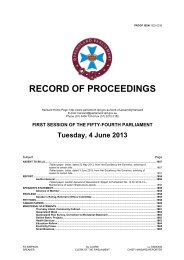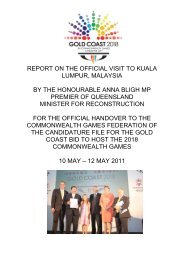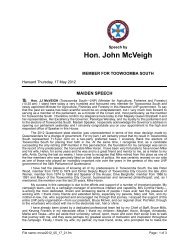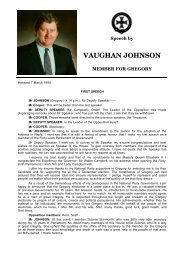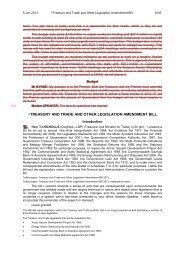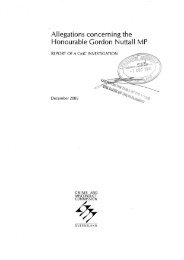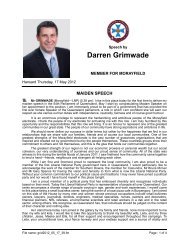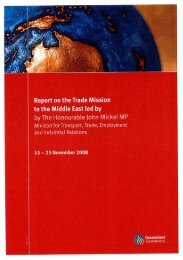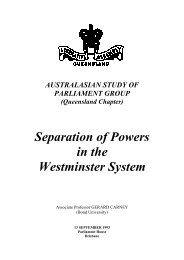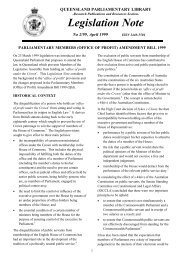weekly hansard - Queensland Parliament - Queensland Government
weekly hansard - Queensland Parliament - Queensland Government
weekly hansard - Queensland Parliament - Queensland Government
Create successful ePaper yourself
Turn your PDF publications into a flip-book with our unique Google optimized e-Paper software.
23 Aug 2005 <strong>Queensland</strong> Competition Authority Amendment Bill 2595<br />
and we should shut off trade. Our economy would stop, but where it would first impact—where it would<br />
hit absolutely hardest—would be in the bush. If these people who vote for the member for Tablelands<br />
could not export their produce, we would not be selling things anymore. Some 85 per cent of our sugar<br />
crop, for instance, is exported. Imagine the impact of shutting down agricultural exports. The member for<br />
Tablelands, in seeking to represent her constituents, has to understand that her constituents only make<br />
a living because Australia is part of an open world economy. That is not rocket science; it is just dead<br />
basic economics.<br />
There are three basic aspects of this bill. The first is that it makes QCA determinations applicable<br />
to the lessees of assets even when they are not the owner. That is the case with the much talked about<br />
Dalrymple Bay where the state owns the assets, but it is leased to Prime Infrastructure which, in turn, is<br />
owned by Babcock and Brown. Secondly, the bill increases the QCA’s role in arbitration and dispute<br />
resolution. That is, it can get the parties talking. Thirdly, it allows the QCA to share information with<br />
relevant <strong>Queensland</strong> government departments that are coregulators.<br />
I want to again touch very briefly on some of the debate that has gone around matters to do with<br />
the QCA in recent times. In particular, I want to touch on the abject hypocrisy of the federal government<br />
on these matters. In May the now former Deputy Prime Minister, John Anderson, described the<br />
bottleneck of coal exports at Dalrymple Bay as a national disgrace. He was particularly hard on the<br />
<strong>Queensland</strong> government for having allowed this to happen. The hypocrisy of this situation is surreal. We<br />
have the members of the Liberal Party, who are great advocates of privatisation, now trying to open up<br />
the market in industrial relations. They are the free market gurus who want to bash up the state for<br />
leasing an asset to a private provider.<br />
Members have to ask: in this debate, which side are they on? Do the members of the Liberal<br />
Party think that the state should own and operate all of our infrastructure, which is what they were<br />
suggesting, or do they think that it should be privatised and leased to the private sector? In this debate<br />
we can have it only one way or the other. The federal government, in fact, supported very much what we<br />
had done in leasing Dalrymple Bay to Prime Infrastructure. But it saw the opportunity to take a kick at us<br />
when there were problems. That is just rank hypocrisy. It is the most short-term political opportunism. I<br />
really think that a government that completely lacks an abiding philosophical base on economic issues<br />
can never be trusted. But I guess we already know that about John Howard and the federal government.<br />
Of course, the real problem was not the bottleneck at Dalrymple Bay. The real problem was that<br />
Australia’s current account deficit had reached seven per cent—an absolutely shocking level—and the<br />
federal government was casting around looking for someone to blame. It decided that the fact that we<br />
could not dig up our coal and ship it offshore at a rapid rate was as good a point to start as any.<br />
Members then have to ask: why is Australia’s current account deficit so high? That is a really serious<br />
economic question. The reason Australia’s current account deficit is so high is not that we cannot dig up<br />
our coal and ship it out fast enough; the reason we have this serious structural flaw in our economy is<br />
that the federal government does not have a particular economic strategy for where we are going in the<br />
future.<br />
In the debate on the industrial relations legislation a week ago I talked about the fact that we do<br />
not have a strategy on integrating the environment with our economic policy. We do not have a strategy<br />
for genuinely creating a knowledge nation. At a national level we do not have any strategy except to<br />
open up our economy more and more and more. That is not good enough. While that is our only<br />
strategy, we will deregulate, we will lower our wage costs and we will need to dig up our dirt and our<br />
rocks and our coal and ship them out as fast as we can because we do not have any kind of higherorder<br />
aim. That is the major failing of the Howard government. That is why it has been casting around<br />
looking for excuses over things such as Dalrymple Bay. That is where the federal government needs to<br />
do better. That is where we contrast with the federal government so greatly. We have a Smart State<br />
agenda. That is where we show them the way. That is where we continue to lead them on economic<br />
policy. Today, this debate touches on those issues because the federal government bought into it over<br />
Dalrymple Bay. I very much support the bill.<br />
Mrs LIZ CUNNINGHAM (Gladstone—Ind) (3.13 pm): In rising to speak to the <strong>Queensland</strong><br />
Competition Authority Amendment Bill, I wish to raise several matters and to seek clarification on a<br />
couple of matters. The QCA was established to allow competition to be examined within the<br />
<strong>Queensland</strong> context. At the time the enacting legislation was to be presented to this parliament I can<br />
remember expressing some concerns in a briefing on it. I was told that without the QCA legislation the<br />
competition matters would be assessed, considered and decided by the national competition authority,<br />
which would take an Australia-wide view, if you like, and would not know some of the detail and the<br />
information that related specifically to <strong>Queensland</strong>. On that basis, it was possible for <strong>Queensland</strong>ers to<br />
be significantly disadvantaged. So the idea of the QCA was to establish a competition authority that<br />
would look after the best interests of <strong>Queensland</strong>ers and ensure that monopoly entities, in their decision<br />
making, would make decisions that were favourable in terms of service provision to our communities.<br />
I have to say that, although I do not have a lot to do with many of the decisions of the QCA, one<br />
or two of them have generated a deep concern within my electorate. It is on that basis that I have some



